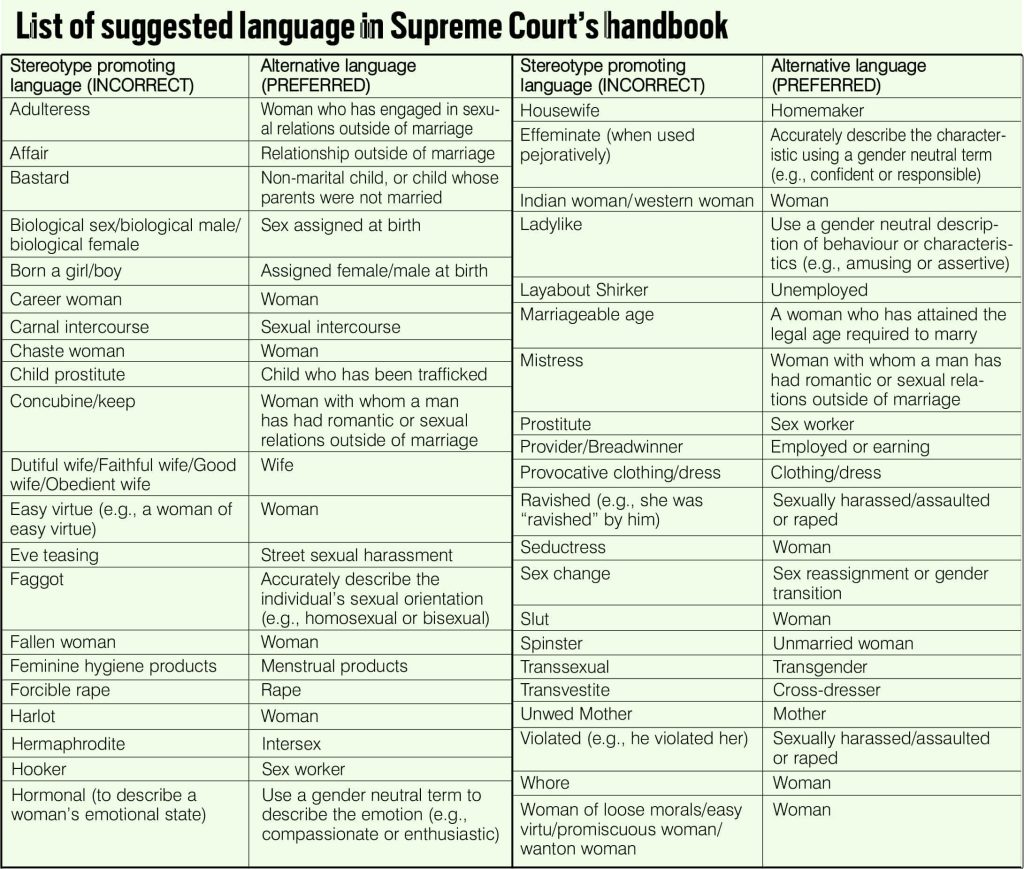The Chief Justice of India (CJI), DY Chandrachud, recently announced the unveiling of the handbook when a five-judge bench headed by him came up for hearing on petitions challenging the abrogation of Article 370 of the Constitution. The “Handbook on Combating Gender Stereotypes” was conceptualised during the Covid-19 pandemic and originally envisaged as a part of the knowledge component of the e-Committee of the Supreme Court of India. The handbook is of 30 pages and has been prepared by a committee of three women justices. They include Justice Prabha Sridevan and Justice Gita Mittal and Professor Jhuma Sen. At the same time, this committee was headed by Justice Moushumi Bhattacharya of the Calcutta High Court.
The CJI said that the “Handbook on Combating Gender Stereotypes” aims to assist judges and the legal community in identifying, understanding and combating stereotypes about women. It contains a glossary of gender-unjust terms and suggests alternative words or phrases which may be used while drafting pleadings as well as orders and judgments. The CJI further said that the handbook identifies common stereotypes about women, many of which have been utilised by courts in the past and demonstrates why they are inaccurate and how they may distort the application of the law. The intention is not to criticise or cast doubt on past judgements, but merely to show how stereotypes may unwittingly be employed. Finally, it encapsulates the current doctrine on key legal issues which may be relevant while adjudicating certain cases, particularly those concerning sexual violence.

The CJI also said that the handbook is widely read by all members of the legal profession in India to ensure that legal reasoning and writing is free of harmful notions about women. He pointed out that the handbook will give a fresh impetus to our quest towards a gender-just legal order, and will be a crucial document to ensure that courts can deliver equal and impartial justice to individuals of all genders.
The handbook offers guidance on how to avoid utilising harmful gender stereotypes, in particular those about women, in judicial decision-making and writing. With respect to the judiciary, it is vital that judges not only avoid relying on stereotypes in their decision-making and writing, but also actively challenge and dispel harmful stereotypes. If harmful stereotypes are relied on by judges, it can lead to a distortion of the objective and impartial application of the law. This will perpetuate discrimination and exclusion. To raise awareness against the utilisation of harmful stereotypes, particularly those prejudicial to women, this handbook aims to explain what stereotypes are, and help judges identify and avoid such stereotypes by—
(1) Identifying language that promotes gender stereotypes and offering alternative words and phrases; and
(2) Identifying common reasoning patterns that are based on gender stereotypes (particularly about women) and discussing why they are incorrect.
(3) Highlighting binding decisions of the Supreme Court of India that have rejected these stereotypes and can be utilised by judges to dispel gender stereotypes.
The Supreme Court of India has laid down important precedents that categorically reject several of the stereotypes discussed in this handbook. These precedents are binding on all courts within the territory of India by virtue of Article 141 of the Constitution of India.
“This Handbook aims to serve as a guide for judges, raising awareness on the need to avoid stereotypes against women in all facets of their decision-making and writing. As guardians of the legal and constitutional system, it is incumbent that members of the judiciary avoid employing stereotypes and dispense justice impartially.
Women have historically faced numerous prejudiced beliefs and stereotypes, impeding their access to fair and equal treatment within society and the justice system. The Indian judiciary must recognise the deep-rooted impact of gender stereotypes and actively work to dismantle them from its thinking, decision-making, and writing. By consciously avoiding the use of stereotypes in decision-making and stereotype promoting language, the judiciary can foster an environment where gender equality is upheld and respected. Words matter, as they shape narratives and influence societal attitudes. The use of more inclusive language can help break harmful patterns of thinking. While this Handbook has primarily focussed on gender stereotypes that concern women, it is important to realise that stereotypes impact individuals from across the gender spectrum. Judges must be vigilant against all forms of gender biases and ensure that every person, regardless of their gender identity, is treated equally and with dignity before the law,” the handbook said.
In his foreword to the handbook, CJI writes that our oath as judges mandates that we “perform the duties of our office without fear or favour, affection or ill-will. The oath demands that we discharge our functions with impartiality and objectivity, applying the law to every case before us. A judge’s oath demands rejecting improper attempts to influence their decision-making. The oath also requires a judge to put aside any preconceived notions about the parties before the court.”
The CJI stated that relying on predetermined stereotypes in judicial decision-making contravenes the duty of judges to decide each case on its merits, independently and impartially. In particular, reliance on stereotypes about women is liable to distort the law’s application to women in harmful ways.
The CJI further stated that even when the use of stereotypes does not alter the outcome of a case, stereotypical language may reinforce ideas contrary to our constitutional ethos. Language is critical to the life of the law. Words are the vehicle through which the values of the law are communicated. Words transmit the ultimate intention of the lawmaker or the judge to the nation. However, the language a judge uses reflects not only their interpretation of the law, but their perception of society as well. Where the language of judicial discourse reflects antiquated or incorrect ideas about women, it inhibits the transformative project of the law and the Constitution of India, which seek to secure equal rights to all persons, irrespective of gender.
“The Code of Civil Procedure 1908 previously referred to persons without financial means as ‘paupers’. In recognition of the fact that language conveys certain ideas about its subject and can either recognise or diminish the dignity of such persons, the statute was amended and the word ‘pauper’ was replaced with the word ‘indigent’. This amendment to the statute did not have a strictly legal purpose but was meant to recognise the humanity of the people it referred to. Similarly, many words or phrases that are used in legal discourse (both by lawyers and by judges) reflect archaic ideas with patriarchal undertones,” the CJI stated in the book.
—By Adarsh Kumar and India Legal Bureau


